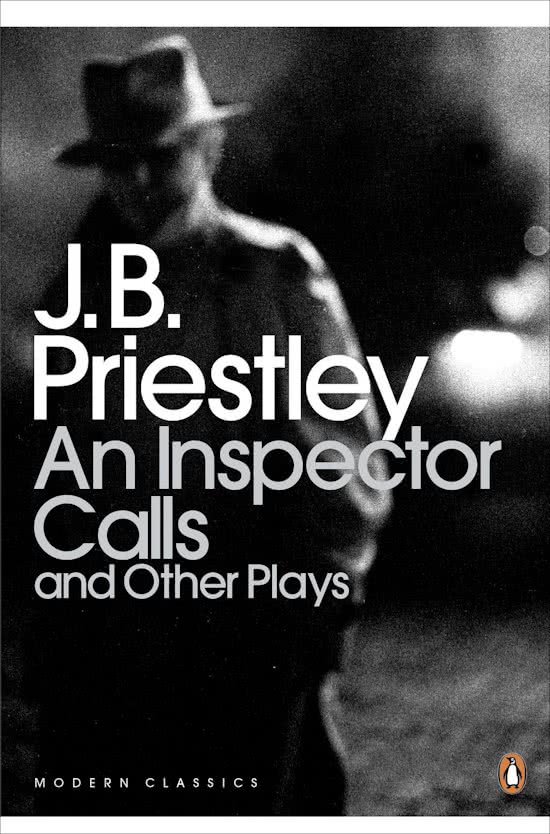The Ultimate GCSE Grade 9 Analysis Bundle for
'An Inspector Calls'
GCSE An Inspector Calls Gerald Grade 9 Analysis
As the play opens up, Gerald is presented as a very immature and shallow figure who is an emblem of
capitalism which Priestley uses as a vehicle to publish his socialist views that capitalism won't be
successful in a growing Britain. This is evident through the use of the rule of 3 in the opening stage
direction when Gerald is described as being an ‘’easily well-bred young man about town’’ This suggests
that Gerald is from a privileged upper-class family who is used to having more power than those below
him, conveying how he may have the same fixed thought and mindset as Mrs. and Mr. Birling who don’t
accept the Inspector's message on social responsibility due to their ‘’hard-headed’’ nature. Similarly, the
fact that Gerald is a ‘’young man’’, even though he is in his ‘’early thirties’’, suggests that he has not yet
entered the phase of adulthood where he is as if unable to look after himself, emphasizing how Gerald is
still yet morally young where still needs guidance and support from Mr. and Mrs. Birling so that he can
live as an adult.
Alternatively, the use of these references may also be Priestley way of criticizing and blaming the older
generation in the upper class during Edwardian society for their stubborn character and way of living life
as it is evident that because of Gerald's parents, he too is forced to grow up like them where he doesn’t
have a lot of challenges in life due to their high class and being financially stable; which was commonly
done by taking advantage over those below them and force them to work under extreme conditions.
However, this criticism of the upper older generation could be easily argued as even though the upper
class such as Mrs. Biring are arrogant and cruel in ways, Priestly could also be delivering the point that
Capitalism is an outlook of life that Mrs. Birling has been indoctrinated with so intensely in nurture that
she simply is unable to abandon her conservative attitude that she holds - for it is the younger people
like Gerald that are sufficiently ‘’impressionable’’ and able to fuel Priestley's hopes of a new socialist
world of justice and equality. Therefore, Priestley is deliberately criticizing Gerald for his wrongdoings as
Priestley makes it clear that Britain is relying on the newer generations such as Gerald to abolish the
inequalities between the class system and construct a pleasant society by fighting against those who
obtain power such as Mrs. and Mr. Birling.
Gerald then goes on to talk about how he promises that he will make Sheila as ‘’happy’’ as she ‘’deserves
to be’’, implying how Gerald is very comfortable and proud of the way he is living life and the way he is
, treating others around him in a very ‘’unpleasant’’ and ‘’disturbing’’ way, emphasizing how those that
are brought up to a family with lots of power automatically don’t have a lot of pressures and
responsibility in life, where the only thing they should care about is feeling ‘’superior’’, causing them to
be insular about their wrongdoings. This insight into Gerald's way of life is a Priestley way of using
Sheila's character as a pawn to provide us readers a teaser of how comfortable and relaxed the upper-
class people are, which seems ironic as they oppressed the poorer people with an excuse of having a
huge amount of laziness yet in reality, they are hard-working and diligent people, emphasizing how the
class systems are put in place to mask the flaws and hidden personality of the aristocratic society rather
than being a natural order of life.
However, looking at this from a Biblical lens, this huge amount of pride and comfort Gerald claims to
have also links to the deadly sin of ‘’pride’’, demonstrating how Gerald should quickly reject capitalist
views but accept responsibility as being a resemblance for a deadly sin during earl Christianity is seen to
not only harm those around Gerald but also anger God, meaning in Christianity, he will face eternal
damnation in the afterlife in ‘’fire, blood and anguish’’ Therefore, Priestley is wanting to shine a
‘’brighter’’ and ‘’harder’’ beacon of light to those possessing power during society in 1912 where he
believes that power is the tool that forced destruction and deaths to take place as he is hinting that
through Geralds actions of being a ‘’respectable citizen’’, it will cause more people from lower classes to
feel exasperated and endangered from the detrimental effects of poverty.
However, towards the end of the novel, Priestley provides a sense of hope to us readers on Gerald
changing his ways as he develops a very sorrowful atmosphere through the use of the repetition of the
pronoun ‘’she’’ when Gerald believes that ‘’she didn’t blame me at all’’ but wishes to ‘’God she had
now’’. This suggests how Gerald regrets his wrong and irrational interactions in Eva Smiths' life and
wishes he would have realized his affairs with her during her time alive, implying how he clearly
understands Priestley's message of social responsibility as it is obvious that he has learned from his
mistake by feeling ’’upset’’ and is eager on changing his ways. The use of the noun ‘’God’’ could also
emphasize how Gerald is repenting back to God and asking for forgiveness by reconnecting back to the
beliefs in Christianity of caring for one another, which clearly illustrates how not only is Priestley's
message significant in Edwardian society but also in Christianity as it aids them to come closer to Gods
teachings, reinforcing how the upper classes actions are wrong and must be changed by following
Priestley message of being ‘’responsible for each other’’. Therefore, a labour-saving audience will agree
with this thesis that people should reject self-centred and materialistic personalities as, during this
period, they grew tired of this image of Capitalistic ideology because they have persevered through the
labour forces (working in factories and on the front lines of war) and know the true value of honest work
should be rewarded in the worker’s efforts. This also has links to the way Sheila presents herself to the
Inspector as she also believes that these ‘’girls are not cheap labour’’ but are ‘’people’’, illustrating how
Gerald is a parallel of Sheila who recognizes that people deserve to be treated humanely and with care
no matter their class and status.
On the contrary, the fact that Gerald ‘’wishes’’(adjective) to ‘’God’’ suggests how it is too late for Gerald
to transform his ways and become an improved figure as he is longing for God to bring him back to the
past and realize his unlawful actions rather than wanting God to change his brutal personality, providing





